Key takeaways:
- Archival research uncovers personal stories and emotional connections, emphasizing the importance of knowing the historical context of ancestors’ lives.
- Genealogical research connects individuals to their roots, revealing hidden family narratives that empower personal identity and understanding.
- Utilizing diverse resources like libraries, online databases, and engaging with archivists enhances the effectiveness of archival research.
- Challenges such as navigating record volumes and understanding historical context require persistence and adaptability in research approaches.
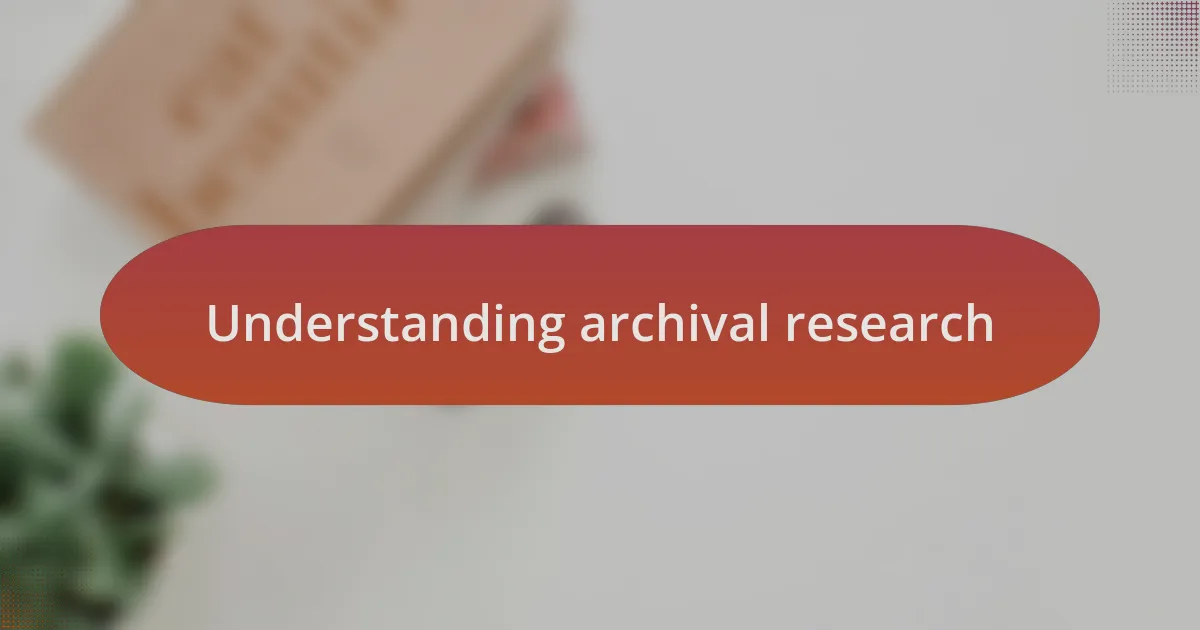
Understanding archival research
Archival research is a fascinating journey into the past, where you sift through primary documents to uncover stories and details that formal history often overlooks. I recall my first visit to an archive—standing amidst old records gave me an electrifying sense of connection to my ancestors. Have you ever felt that thrill when you discover a long-lost letter or photograph?
Delving into these collections opens doors to understanding the context of our relatives’ lives. I vividly remember finding a marriage certificate that felt like a time capsule, revealing not just names, but the socio-economic circumstances of the couple. It made me question: How can we truly appreciate our family’s history without acknowledging the world they lived in?
Many people think archival research is merely about finding facts, but it’s much more than that. It’s about piecing together a narrative that gives life to that data. Finding a handwritten note in my grandmother’s diary transformed my perception of her; suddenly, she wasn’t just a name, but a woman with dreams and struggles. How often do we forget the emotions that fuel our family stories?
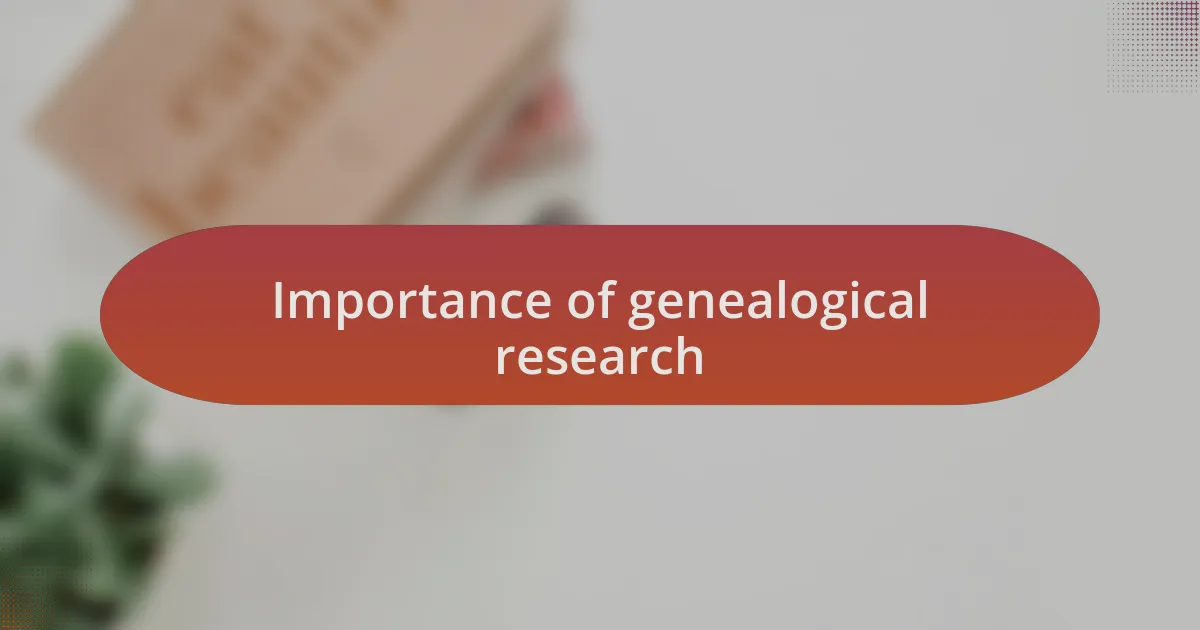
Importance of genealogical research
The significance of genealogical research cannot be overstated, as it connects us to our roots and gives us insight into our family narratives. I remember a moment during my research when I stumbled upon a draft of my great-grandfather’s letter, fraught with hopes and aspirations. Holding that piece of history was a reminder of the sacrifices and dreams that shaped my lineage, highlighting how each individual’s story contributes to a larger tapestry of family history.
Understanding our ancestry enriches not just our identity but also the perspective through which we view the world today. When I learned about my family’s immigration journey, it opened my eyes to the resilience and determination that courses through my veins. Isn’t it fascinating how knowing where we come from can empower us in our present lives?
Moreover, genealogical research often reveals hidden connections and forgotten stories within families. One afternoon, I discovered an old family photograph that included distant relatives I had never known about. This discovery made me ponder: how many stories are just waiting to be uncovered, holding unique lessons that resonate with our current experiences? Embracing these revelations can deepen our understanding of ourselves and those who came before us.
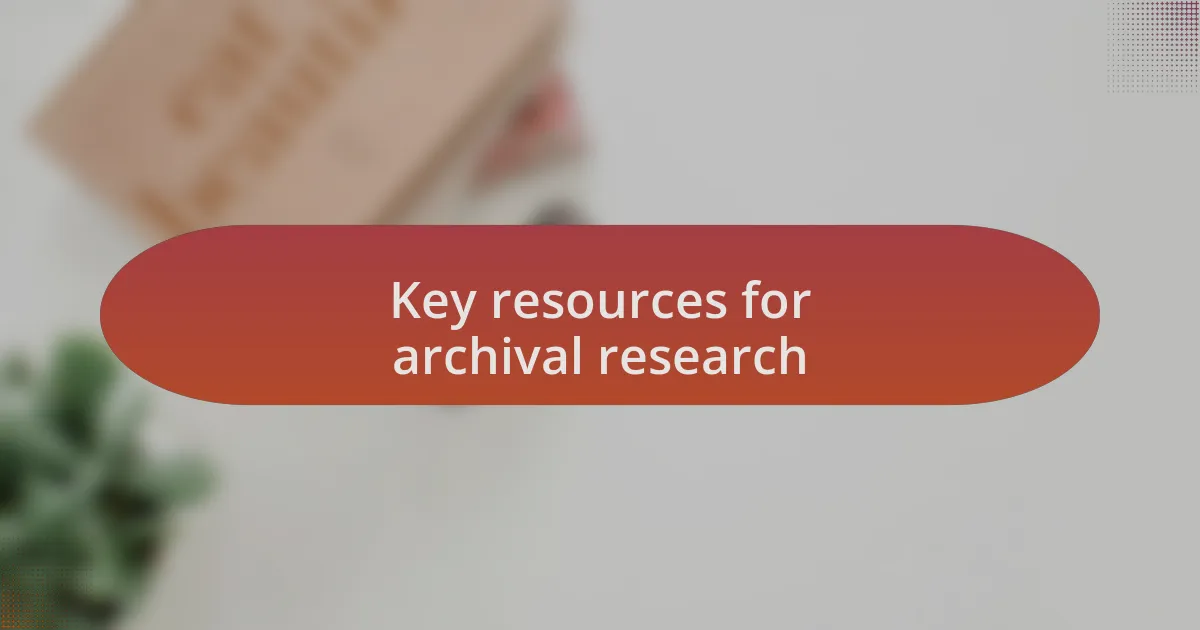
Key resources for archival research
When embarking on archival research, public libraries and local historical societies often serve as invaluable resources. I vividly recall visiting my hometown library and being overwhelmed by the wealth of documents housed there – everything from census records to old newspapers. Each finding felt like uncovering a small piece of a larger puzzle, reinforcing the idea that the stories of our ancestors are often hidden in plain sight, just waiting for someone to explore them.
Another key resource is online databases like Ancestry.com and FamilySearch.org, which have transformed the way genealogists access archival materials. While browsing these platforms, I once came across an online family tree that connected me with distant relatives I had never met. It struck me how technology has made it easier to bridge the gaps in our family histories, inviting collaboration and shared discovery among those chasing the same ancestral paths. Have you explored these online tools yet? If not, I highly recommend diving into them—they can reveal unexpected connections.
Don’t overlook the potential treasures contained within institutional archives, such as churches and universities. I found a trove of baptismal records at a local church, documenting generations of my family. This experience made me consider: how many stories are tucked away in our community’s archives, waiting for someone with a curious heart to bring them to light? Engaging with these institutions can amplify our research and deepen our understanding of our family’s unique narratives.
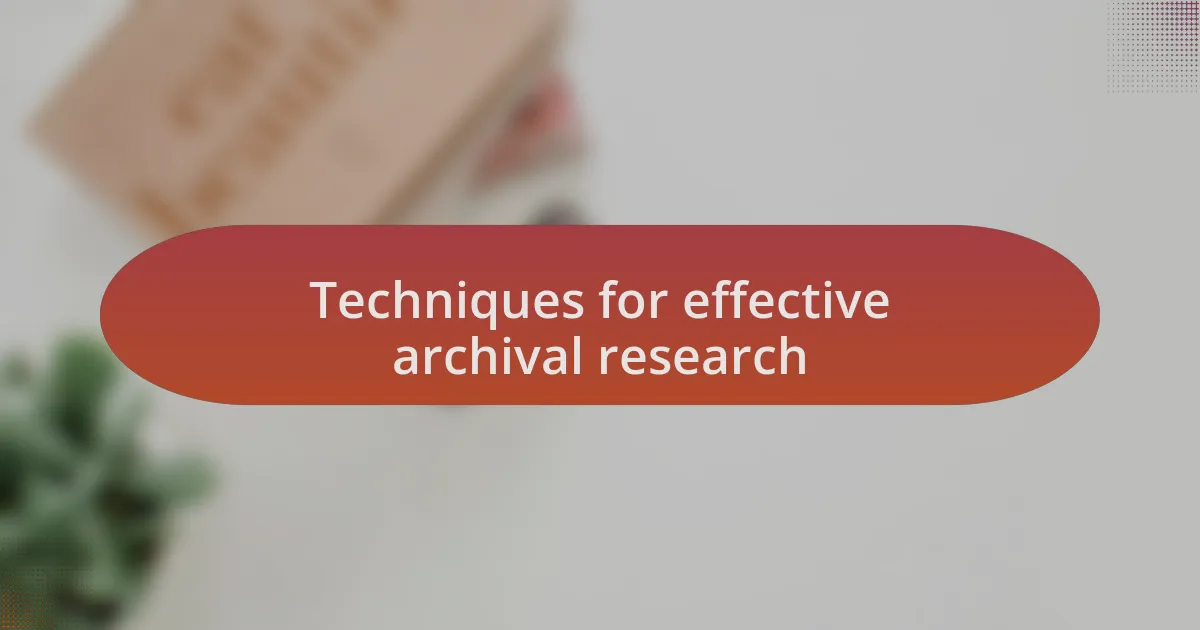
Techniques for effective archival research
When conducting effective archival research, I’ve learned that organization is crucial. Creating a research log can help you track which records you’ve consulted and any relevant notes. I remember the chaos of sifting through stacks of papers; a simple log transformed my approach, making it easier to build connections among generations and families.
One technique that significantly enhanced my experience was developing a specific list of what I was looking for before diving into the archives. For example, I once sought information on my great-grandmother’s immigration journey. Having focused questions in mind not only saved time but also turned my research into a more targeted exploration, leading to breakthroughs I wasn’t expecting. Have you tried this before? It’s incredible how much clearer your path can become with defined goals.
Lastly, I encourage engaging with archivists and librarians during your visits. Their knowledge can be invaluable. When I asked one such librarian for assistance, she pointed me to a collection of letters that ultimately changed my understanding of my family’s past. This experience underscored a vital lesson: collaboration with these experts can unveil resources you might otherwise overlook. Who knows what invaluable insights they may share?
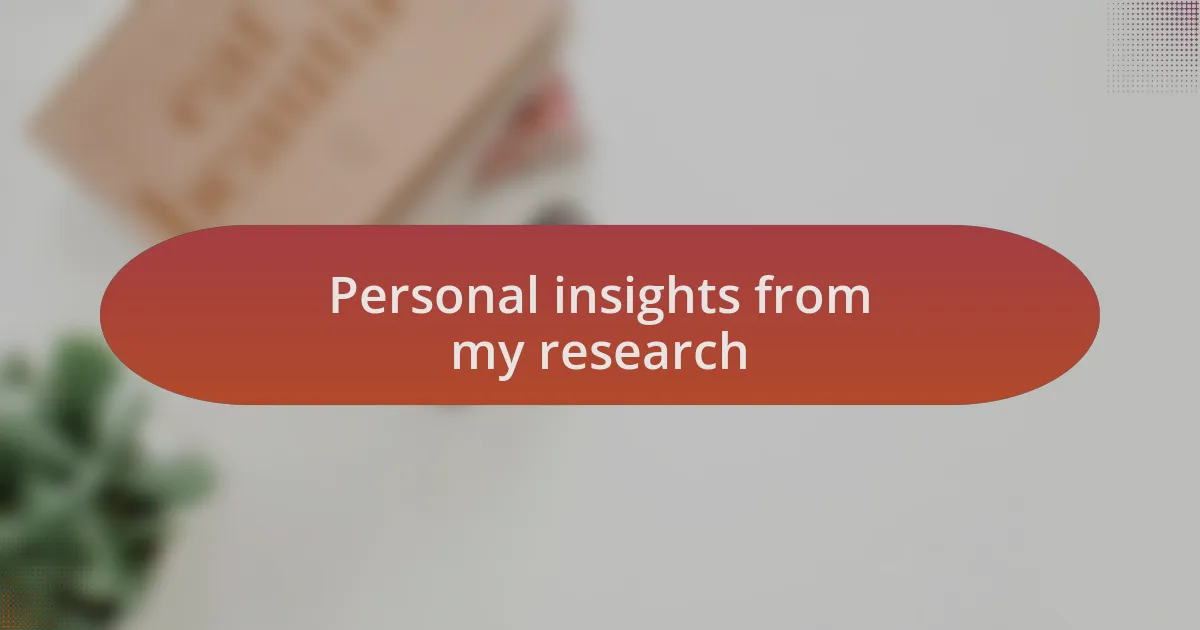
Personal insights from my research
The most surprising insight I gained from my archival research was the emotional weight that personal stories carry. While sifting through census records and birth certificates, I stumbled upon a handwritten letter from my grandfather to his sister during World War II. Reading his candid reflections, I felt a deep connection to the emotions he expressed—fear, hope, and nostalgia. Have you ever experienced the power of a written letter? It reminded me that behind every name in a record lies a human experience, rich with feelings and moments worth exploring.
Another lesson I learned is the importance of patience. I recall spending hours in a dusty archive, only to find a single, fleeting mention of my ancestor. At first, disappointment washed over me. Yet, that tiny piece of information sparked an idea that led to further investigations. It made me realize that each small find can be a stepping stone, leading to larger discoveries. Isn’t it fascinating how persistence can transform frustration into eventual breakthroughs?
Engagement with local communities revealed another layer to my research. I attended a genealogy workshop where participants shared their findings and techniques. One individual shared a photograph of a family reunion that included my great-uncle. This connection not only broadened my understanding of my family’s social ties but also created a network of support. How often do we overlook the value of community in our genealogical journeys? It’s a reminder that collaboration can illuminate paths we may not have considered on our own.
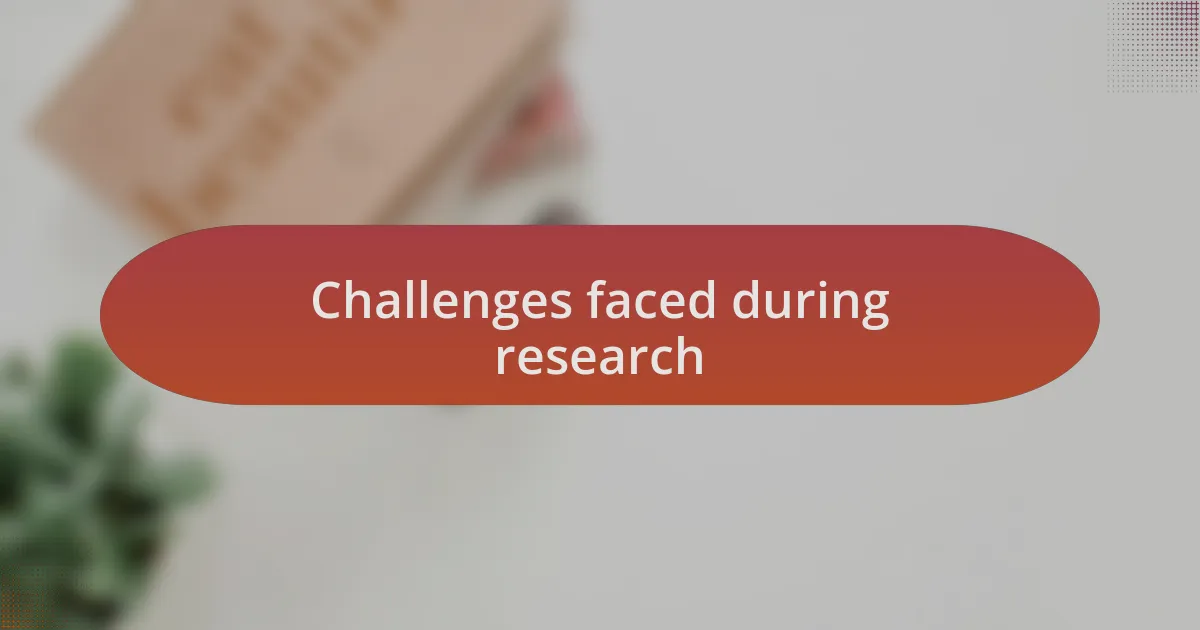
Challenges faced during research
The first major challenge I faced during my archival research was navigating the sheer volume of records. As I flipped through stacks of documents, I quickly realized that not all sources are created equal. Have you ever spent hours searching for a specific name, only to find it misspelled or indexed incorrectly? It’s frustrating, but it’s a reality I had to adapt to. This experience taught me the importance of flexibility and creativity in my search strategies.
Another hurdle was encountering faded or damaged documents. I vividly recall uncovering a marriage certificate that was nearly illegible. Each smudge made it painstakingly difficult to decipher my ancestor’s names. While it was disappointing, I learned the value of perseverance. Sometimes, a little detective work and a good magnifying glass can reveal answers hiding in plain sight. Have you ever had to piece together a story from fragments? It can feel like working on a puzzle without the box lid for guidance.
Lastly, I found that understanding historical context was crucial but often challenging. When I discovered records from the 1800s, I realized that social norms and language were vastly different from today. This gap sometimes led to misconceptions about relationships or events. As I navigated through these intricacies, I was reminded of how important it is to embrace the nuances of the past. Have you considered how historical perspectives could reshape your family story? Engaging with these complexities ultimately enriched my research, offering a deeper understanding of my ancestry’s journey.